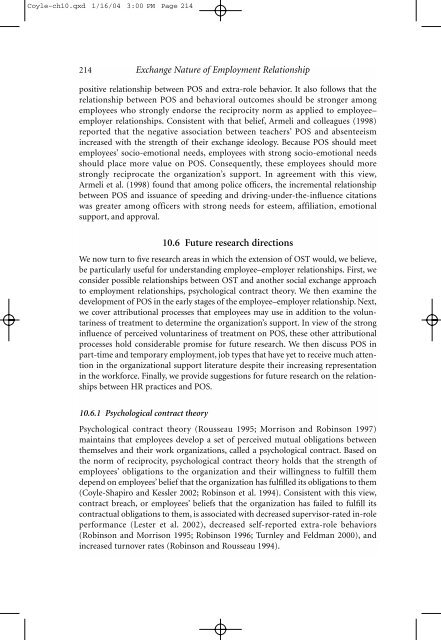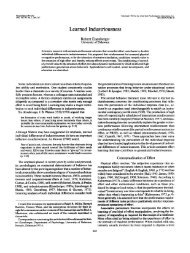Perceived Organizational Support
Perceived Organizational Support
Perceived Organizational Support
You also want an ePaper? Increase the reach of your titles
YUMPU automatically turns print PDFs into web optimized ePapers that Google loves.
Coyle-ch10.qxd 1/16/04 3:00 PM Page 214<br />
214 Exchange Nature of Employment Relationship<br />
positive relationship between POS and extra-role behavior. It also follows that the<br />
relationship between POS and behavioral outcomes should be stronger among<br />
employees who strongly endorse the reciprocity norm as applied to employee–<br />
employer relationships. Consistent with that belief, Armeli and colleagues (1998)<br />
reported that the negative association between teachers’ POS and absenteeism<br />
increased with the strength of their exchange ideology. Because POS should meet<br />
employees’ socio-emotional needs, employees with strong socio-emotional needs<br />
should place more value on POS. Consequently, these employees should more<br />
strongly reciprocate the organization’s support. In agreement with this view,<br />
Armeli et al. (1998) found that among police officers, the incremental relationship<br />
between POS and issuance of speeding and driving-under-the-influence citations<br />
was greater among officers with strong needs for esteem, affiliation, emotional<br />
support, and approval.<br />
10.6 Future research directions<br />
We now turn to five research areas in which the extension of OST would, we believe,<br />
be particularly useful for understanding employee–employer relationships. First, we<br />
consider possible relationships between OST and another social exchange approach<br />
to employment relationships, psychological contract theory. We then examine the<br />
development of POS in the early stages of the employee–employer relationship. Next,<br />
we cover attributional processes that employees may use in addition to the voluntariness<br />
of treatment to determine the organization’s support. In view of the strong<br />
influence of perceived voluntariness of treatment on POS, these other attributional<br />
processes hold considerable promise for future research. We then discuss POS in<br />
part-time and temporary employment, job types that have yet to receive much attention<br />
in the organizational support literature despite their increasing representation<br />
in the workforce. Finally, we provide suggestions for future research on the relationships<br />
between HR practices and POS.<br />
10.6.1 Psychological contract theory<br />
Psychological contract theory (Rousseau 1995; Morrison and Robinson 1997)<br />
maintains that employees develop a set of perceived mutual obligations between<br />
themselves and their work organizations, called a psychological contract. Based on<br />
the norm of reciprocity, psychological contract theory holds that the strength of<br />
employees’ obligations to the organization and their willingness to fulfill them<br />
depend on employees’ belief that the organization has fulfilled its obligations to them<br />
(Coyle-Shapiro and Kessler 2002; Robinson et al. 1994). Consistent with this view,<br />
contract breach, or employees’ beliefs that the organization has failed to fulfill its<br />
contractual obligations to them, is associated with decreased supervisor-rated in-role<br />
performance (Lester et al. 2002), decreased self-reported extra-role behaviors<br />
(Robinson and Morrison 1995; Robinson 1996; Turnley and Feldman 2000), and<br />
increased turnover rates (Robinson and Rousseau 1994).



